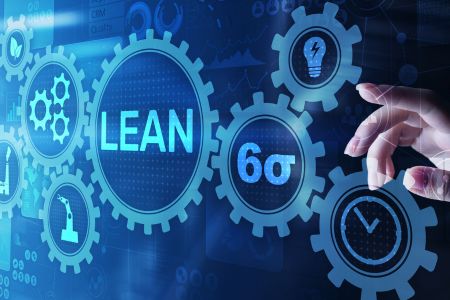Lean eCommerce, rooted in lean administration rules, goals to maximise buyer worth whereas minimizing waste, guaranteeing that each course of, from stock administration to buyer engagement, is as environment friendly and value-driven as potential. We break down the important thing parts of lean eCommerce, the seven steps to implement a lean eCommerce model, and talk about the advantages of lean eCommerce.
What’s Lean eCommerce?

Lean eCommerce is an modern enterprise technique that adapts the lean administration rules of maximizing worth whereas minimizing waste, tailor-made particularly for eCommerce. Itâs about creating extra worth for purchasers with fewer sources. This system focuses on understanding buyer worth, streamlining processes, and enhancing effectivity throughout all elements of on-line enterprise operations. By making use of lean rules, eCommerce corporations can considerably enhance service high quality, scale back prices, and enhance buyer satisfaction and loyalty.
Key Parts of Lean Ecommerce
We are going to now break down the important thing parts of lean eCommerce. Listed below are the first parts to concentrate on:
- Buyer-centric strategy: Lean eCommerce revolves round deeply understanding and constantly assembly buyer wants and preferences. It leverages information analytics to realize insights into buyer habits and tailors the buying expertise accordingly.
- Streamlined operations: Streamlined operations contain optimizing each facet of the eCommerce provide chain, from stock administration and order achievement to transport and returns. Methods akin to demand forecasting and just-in-time stock are employed to make sure that sources are used effectively.
- Steady enchancment: Lean eCommerce adopts a tradition of Kaizen, or steady enchancment, the place processes are persistently analyzed and refined. This dynamic strategy permits companies to stay agile and aware of altering market traits and buyer expectations.
- Waste discount:By figuring out and eliminating non-value-adding actions, lean eCommerce corporations can scale back prices and enhance operational effectivity, together with bodily waste and time and sources spent on unproductive actions.
- Expertise and automation: Superior applied sciences, together with AI, machine studying, and automation instruments, are essential in enabling lean practices. They assist streamline operations, present personalised buyer experiences, and make data-driven selections.
By specializing in effectivity, buyer worth, and agility, corporations can navigate the complexities of on-line commerce and emerge as leaders of their respective markets.
How To Implement a Lean eCommerce Model in 7 Steps
We are going to now clarify learn how to implement a lean eCommerce model in 7 detailed steps.
1. Outline Your Worth Proposition
Step one in making a lean eCommerce model hinges on a deep understanding of buyer’s wants and preferences.
Perceive Buyer Wants:
Lean eCommerce prioritizes delivering worth from the client’s perspective. By understanding buyer wants, eCommerce companies can be certain that each product, service, and course of is designed to satisfy these wants effectively, eliminating components that don’t add worth from the customerâs viewpoint.
- Have interaction in Buyer Analysis: Make the most of qualitative and quantitative analysis strategies to assemble insights about your target market. Instruments like surveys, focus teams, and buyer interviews can present useful info on what your prospects worth most to assist enhance retention charges. A examine by Bain & Firm highlights that growing buyer retention charges by 5% can enhance earnings by 25% to 95%.
- Analyze Buyer Information: Use analytics instruments to dive deep into buyer information. Look at buy historical past, web site navigation patterns, and social media engagement to establish traits and preferences. This information can reveal what prospects are on the lookout for in services or products and spotlight areas for enchancment.
- Market Evaluation: Conduct an intensive market evaluation to know the aggressive panorama and establish gaps out there that your eCommerce model can fill. Instruments like SEMrush and Google Tendencies can assist you gauge market demand and competitor methods.
- Buyer Suggestions: Repeatedly gather and analyze buyer suggestions by means of evaluations, social media, and post-purchase surveys. This direct suggestions is invaluable in understanding buyer satisfaction and areas the place your services or products might be enhanced.
- Persona Growth: Create detailed buyer personas based mostly in your analysis. These personas ought to encapsulate your supreme prospects’ traits, wants, and habits patterns, serving as a reference level for tailoring your worth proposition.
By synthesizing this info, companies can craft a price proposition that resonates deeply with their target market, promising a services or products and an answer to their particular wants and wishes.
2. Streamline Your Operations
The following essential step entails a meticulous examination of your total provide chain to establish and rectify any inefficiencies, spanning from procurement to supply.
Optimize the Provide Chain:
This course of is important for eliminating waste and enhancing the effectivity of sources throughout the board. Key methods embody:
- Demand Forecasting: Demand forecasting permits for smarter stock administration, lowering the prices related to overstocking or stockouts. Instruments like Google Analytics and specialised forecasting software program (e.g., Forecast Professional and SAS Demand-Pushed Forecasting) allow companies to research historic gross sales information, buyer habits patterns, and market traits.
- Simply-in-Time Stock: Undertake a just-in-time (JIT) stock system, which entails ordering and receiving items solely as they’re wanted within the manufacturing course of. This technique minimizes stock prices and reduces waste, requiring exact provider coordination.
- Provider Relationships: Strengthen relationships with suppliers to make sure reliability and high quality, which could contain negotiating higher phrases, bettering communication channels, or diversifying your provider base to scale back danger and enhance provide chain resilience. Platforms like Jaggaer and SAP Ariba facilitate higher communication, negotiation, and provider collaboration.
- Course of Optimization: Conduct an intensive evaluation of all provide chain processes to establish bottlenecks or redundant steps that may be streamlined or automated. Complete SCM options (e.g., Infor SCM, Blue Yonder) supply real-time visibility throughout the availability chain, from stock ranges to order standing and supply monitoring.
- Sustainability Practices: Incorporate sustainable practices into your provide chain operations, akin to utilizing eco-friendly packaging or optimizing logistics to scale back carbon emissions, lowering environmental impression, however may also attraction to eco-conscious customers and improve your model picture. Software program like Routific or OptimoRoute optimizes supply routes to scale back gas consumption and carbon emissions.
By systematically optimizing the availability chain by means of these targeted actions, companies can considerably scale back operational waste and enhance general effectivity, setting a stable basis for a lean eCommerce operation.
Simplify Product Choices:
An efficient lean eCommerce technique additionally entails a deliberate simplification of product choices. This motion is based on an in depth evaluation of your product vary to establish which gadgets most carefully align with buyer wants and contribute considerably to enterprise worth. By concentrating on these high-value merchandise, you possibly can obtain a number of key advantages:
- Lowered Complexity: Instruments like Zoho Stock or Oracle NetSuite supply strong stock monitoring and administration options, simplifying the method of monitoring inventory ranges, forecasting demand, and planning reorders for a streamlined product vary. This simplicity can result in extra environment friendly procurement, stocking, and distribution processes.
- Decrease Prices: A targeted product vary can considerably decrease prices associated to stock storage, administration, and wastage. With fewer merchandise to deal with, you possibly can optimize stock ranges, lowering the necessity for intensive warehouse area and minimizing the chance of overstocking. Furthermore, platforms akin to WMS techniques from Manhattan Associates or HighJump allow extra environment friendly use of warehouse area and sources.
- Enhanced Advertising and marketing Effectiveness: Advertising and marketing efforts turn into extra focused and efficient whenever you focus on selling fewer, extra related merchandise. This focus permits for clearer messaging and higher alignment with buyer pursuits, resulting in greater engagement and conversion charges.
- Improved Product High quality: Specializing in a narrower product vary allows you to make investments extra in high quality enchancment and innovation for these merchandise. This will improve your model’s status for high quality and drive buyer loyalty.
- Information-Pushed Resolution-Making: Use gross sales information, buyer suggestions, and market evaluation to establish which merchandise are most valued by your prospects. Software program like Tableau or Microsoft Energy BI analyzes gross sales information to establish traits, finest sellers, and underperformers, guiding selections on which merchandise to emphasise or section out.
Companies can create a extra manageable, cost-effective, and customer-focused stock by simplifying product choices based mostly on strategic evaluation and buyer suggestions.
3. Embrace Expertise and Automation

A pivotal component in advancing a lean eCommerce technique is the adoption of recent know-how and automation.
Leverage Reducing-edge Instruments:
This step entails integrating state-of-the-art instruments designed to automate mundane duties and refine operational effectivity. By leveraging these technological developments, companies can obtain important enhancements in numerous areas:
- AI-Powered Buyer Service: Implement AI chatbots like Intercom or Drift in your eCommerce platform to deal with widespread buyer inquiries, akin to monitoring orders or answering product questions, lowering response occasions and bettering buyer satisfaction whereas permitting your crew to deal with extra advanced buyer wants.
- Machine Studying for Demand Forecasting: Use machine studying instruments, akin to TensorFlow or IBM Watson, to research historic gross sales information and predict future demand traits. These predictions can assist regulate stock ranges dynamically, avoiding overstock or stockouts and lowering storage prices.
- Enhanced eCommerce Platforms: Improve to eCommerce platforms that help automation and personalization, like Shopify Plus or Magento, which supply options for automated advertising and marketing, personalised buying experiences based mostly on consumer habits, and streamlined checkout processes.
- Automated Stock Administration: Undertake stock administration software program like Zoho Stock or Cin7, which robotically updates inventory ranges throughout a number of gross sales channels in real-time, triggers reorder alerts for low inventory gadgets, and offers detailed stock studies to optimize inventory ranges.
- Environment friendly Order Processing: Use order administration techniques akin to Orderhive or Brightpearl to automate the order-to-fulfillment course of, guaranteeing orders are processed shortly and precisely. These techniques can combine together with your stock administration and transport suppliers, automating duties from order receipt to supply.
- Logistics and Transport Automation: Implement logistics software program like ShipStation or Flexport to automate transport processes, together with label printing, service choice based mostly on charges and supply occasions, and monitoring shipments, lowering transport prices and bettering supply occasions, enhancing the client expertise.
By embracing know-how and automation, lean eCommerce companies can considerably improve operational effectivity, enhance buyer experiences, and make knowledgeable selections based mostly on information insights. This strategic integration of know-how helps lean administration rules by lowering waste and maximizing worth and positions corporations to remain aggressive.
4. Foster a Tradition of Steady Enchancment
Fostering a tradition of steady enchancment is indispensable to actually embody a lean eCommerce strategy.
Implement Kaizen:
Steady enchancment entails embracing the Japanese idea of Kaizen, which signifies the philosophy of creating small, incremental modifications for the higher. Right here’s learn how to operationalize this precept inside your group:
- Embed Steady Enchancment in Firm Values: Make steady enchancment a core a part of your organization’s values and operational ethos, which might be initiated by means of management by setting examples, sharing success tales of enhancements, and recognizing crew contributions to a tradition of enhancement and innovation.
- Common Suggestions Loops: Set up mechanisms for fixed suggestions from all stakeholders, together with staff, prospects, and suppliers. Instruments like Slack for inner communication, SurveyMonkey for buyer suggestions, and common provider evaluations can facilitate open dialogues for strategies and considerations, permitting for real-time insights into potential enhancements.
- Course of Analysis and Refinement: Implement a structured strategy to judge and refine processes constantly. Use methodologies just like the PDCA (Plan-Do-Verify-Act) cycle to systematically check and implement course of modifications. Software program instruments akin to Asana or Trello can be utilized to trace progress on enchancment initiatives, guaranteeing that actions are taken based mostly on suggestions and evaluations.
- Coaching and Growth: Put money into coaching applications that equip staff with the talents and mindset wanted for steady enchancment. Workshops on lean administration, problem-solving strategies, and information evaluation can empower staff to establish inefficiencies and suggest options.
- Innovation Encouragement: Create an surroundings that encourages innovation and experimentation. Set up a fund or dedicate time for workers to work on tasks that discover new concepts or enhancements, even when they fall exterior their common obligations. Google’s well-known “20% time” coverage is a major instance of how permitting staff to discover new concepts can result in important improvements.
- Efficiency Metrics for Steady Enchancment: Arrange particular KPIs associated to steady enchancment efforts, such because the variety of enhancements carried out, the discount in waste, or enhancements in buyer satisfaction scores. Instruments like Looker Studio can be utilized to create dashboards that monitor these KPIs, making the impression of steady enchancment efforts seen and quantifiable.
By systematically fostering a tradition of steady enchancment by means of these actions, companies can be certain that their operations stay dynamically aligned with the rules of lean eCommerce, which not solely enhances operational effectivity and buyer satisfaction but additionally drives a tradition of empowerment and innovation throughout the group.
5. Get rid of Waste
Incorporating waste elimination into your lean eCommerce technique is essential for optimizing effectivity and enhancing worth.
Establish Non-value-adding Actions:
This step focuses on figuring out and eradicating non-value-adding actions throughout your operations. Hereâs an in depth strategy to systematically eradicate waste:
- Waste Identification Workshops: Set up workshops with groups throughout totally different departments to map out present processes and establish areas of waste. Use strategies like worth stream mapping to visually characterize the movement of supplies and knowledge, highlighting any redundant or non-value-adding steps.
- Stock Evaluation: Make the most of stock administration software program, akin to Fishbowl or Netsuite, to research stock ranges and establish extra inventory that ties up capital and area. Implementing a just-in-time (JIT) stock system can assist reduce extra stock and scale back storage prices.
- Provide Chain Optimization: Evaluation your provide chain for inefficiencies, utilizing instruments like SCM software program (e.g., SAP SCM or Oracle SCM Cloud) to trace and analyze provide chain efficiency. Search for bottlenecks, extreme transportation prices, or provider points that contribute to delays or waste.
- Advertising and marketing Efficiency Audit: Conduct audits of your advertising and marketing methods utilizing analytics instruments like Google Analytics or HubSpot. Consider the ROI of various campaigns and channels to establish underperforming methods that aren’t contributing to buyer acquisition or retention.
- Course of Automation: Establish guide processes which might be time-consuming and vulnerable to errors. Put money into automation instruments, akin to robotic course of automation (RPA) software program like UiPath or Automation Anyplace, to streamline these processes and scale back the waste related to guide errors and inefficiencies.
- Suggestions and Enchancment System: Create a system for workers to simply report observations of waste and recommend enhancements. This might be a digital suggestion field or common innovation conferences. Encourage participation by recognizing and rewarding contributions to waste discount.
By following these steps to establish and eradicate waste, companies can considerably streamline their operations, scale back prices, and enhance general effectivity, supporting the lean eCommerce goal of maximizing worth and fostering a proactive tradition of steady enchancment throughout the group.
6. Concentrate on Buyer Expertise
To excel in a lean eCommerce surroundings, prioritizing buyer expertise is important.
Improve Personalization and Service:
This step goes past operational effectivity to immediately impression how prospects work together with and understand your model. Hereâs learn how to improve personalization and repair:
- Leverage Buyer Information for Personalization: ollect and analyze buyer information utilizing analytics instruments like Google Analytics and CRM techniques akin to Salesforce or HubSpot. This information allows you to perceive buyer behaviors, preferences, and buy historical past, permitting you to make personalised product suggestions and ship tailor-made advertising and marketing messages. Implementing personalization algorithms in your eCommerce platform can dynamically regulate content material, provides, and suggestions based mostly on particular person consumer profiles.
- Segmentation for Focused Advertising and marketing: Use segmentation instruments inside electronic mail advertising and marketing platforms like Mailchimp or advertising and marketing automation platforms like Marketo to categorize your prospects into distinct teams based mostly on their behaviors, pursuits, and buy historical past, enabling you to ship extremely focused and related advertising and marketing campaigns, growing engagement and conversion charges.
- Optimize the On-line Purchasing Expertise: Improve your eCommerce siteâs usability and design by using consumer expertise (UX) design rules. Instruments like Hotjar or Loopy Egg can present heatmaps, session recordings, and consumer suggestions, providing insights into how customers work together together with your web site. Primarily based on these insights, you can also make data-driven changes to enhance navigation, velocity up checkout processes, and make the positioning extra responsive throughout gadgets.
- Responsive and Environment friendly Buyer Service: Implement customer support platforms like Zendesk or Freshdesk to centralize buyer inquiries from numerous channels and guarantee well timed and constant responses. Take into account integrating AI chatbots to offer immediate help for widespread queries and utilizing dwell chat companies for extra advanced points, enhancing responsiveness and lowering wait occasions.
- Gather and Act on Buyer Suggestions: Repeatedly collect buyer suggestions by means of surveys, social media listening, and overview platforms like Trustpilot. Analyze this suggestions to establish areas for enchancment in your product choices, buying expertise, or customer support. Appearing on this suggestions not solely improves the client expertise but additionally demonstrates to prospects that their opinions are valued and brought critically.
By specializing in these particular methods to boost personalization and repair, companies can considerably enhance the client expertise. This focus not solely meets the lean eCommerce purpose of maximizing worth but additionally builds buyer belief and loyalty, that are essential for long-term success within the aggressive eCommerce panorama.
7. Measure and Modify

Itâs crucial to determine, measure, and regulate based mostly on Key Efficiency Indicators (KPIs) to make sure the continued effectiveness of a lean eCommerce technique.
Use Key Efficiency Indicators (KPIs):
This last step entails a cycle of analysis and refinement to repeatedly align enterprise operations with strategic aims. Hereâs learn how to successfully implement this step:
- Establish Related KPIs: Begin by figuring out which KPIs are most related to your lean eCommerce aims. Frequent eCommerce KPIs embody conversion fee, common order worth, buyer lifetime worth, cart abandonment fee, and buyer satisfaction scores. Moreover, incorporate lean-specific KPIs akin to stock turnover fee, order achievement occasions, and the speed of return on account of defects.
- Make the most of Analytics Instruments: Leverage analytics instruments like Google Analytics for web site efficiency, Klaviyo or Looker Studio for advertising and marketing analytics, and stock administration software program for provide chain insights. These instruments can monitor your chosen KPIs in actual time, offering useful information to tell decision-making.
- Dashboard Creation for Actual-time Monitoring: Create dashboards utilizing platforms like Tableau, Energy BI, or Looker Studio to visualise KPIs in a understandable and actionable format. Dashboards enable for at-a-glance monitoring of efficiency in opposition to targets, enabling fast identification of traits and deviations.
- Common Evaluation Classes: Schedule common overview periods (e.g., month-to-month or quarterly) to evaluate KPI efficiency. These periods ought to contain key stakeholders throughout departments to make sure a complete evaluation of knowledge and foster a collaborative strategy to addressing any points.
- Implement a Suggestions Loop: Develop a structured suggestions loop the place insights from KPI evaluation are used to tell operational changes, which might contain optimizing advertising and marketing campaigns, revising stock ranges, or implementing new customer support protocols to handle areas the place KPIs point out underperformance.
- Agile Adjustment Course of: Embrace an agile strategy to creating changes based mostly on KPI insights, which means being ready to check new methods, undertake technological improvements, or pivot operations in response to KPI evaluation. The agility to regulate ways swiftly is essential within the dynamic eCommerce panorama.
- Steady Studying and Enchancment: Use KPI evaluation not only for operational changes but additionally for strategic studying. Understanding the explanations behind KPI efficiency can present deep insights into buyer habits, market traits, and inner course of efficiencies, guiding broader strategic selections.
Lean eCommerce operations can keep a aggressive edge by meticulously measuring efficiency in opposition to well-defined KPIs and being ready to make data-driven changes. This cycle of measurement and adjustment ensures that the enterprise stays aware of altering market situations, buyer wants, and operational challenges, driving steady enchancment and progress.
Advantages of Lean eCommerce
The adoption of lean rules in eCommerce operations brings forth a mess of benefits that may revolutionize the best way companies function on-line. Lean eCommerce, by design, focuses on creating extra worth for purchasers with fewer sources, resulting in a extremely environment friendly and customer-centric enterprise mannequin. Beneath are the numerous advantages derived from implementing lean methods in eCommerce, based mostly on rules and outcomes noticed in apply:
Enhanced Buyer Expertise
- Personalization and Responsiveness: Lean eCommerce methods leverage deep insights into buyer habits to supply personalised buying experiences, resulting in greater engagement charges and buyer satisfaction as companies can swiftly reply to buyer wants and preferences. In reality, 61% of individuals anticipate manufacturers to customise experiences based mostly on their preferences.
- Improved Service High quality: By specializing in value-adding actions and lowering waste, corporations can supply quicker and extra dependable companies, from faster web site efficiency to quicker supply occasions.
Elevated Operational Effectivity
- Streamlined Processes: Lean practices assist establish and eradicate pointless steps in operations, from stock administration to order achievement. This streamlining leads to extra environment friendly use of sources and a discount in prices related to extra stock and wasted time. Carrying prices, for instance, usually whole as much as 30% of the entire stock worth.
- Automation of Routine Duties: Implementing automation in areas like customer support (by means of AI chatbots) and stock administration reduces guide effort, permitting companies to allocate their sources extra successfully.
Value Discount
- Decrease Stock Prices: Lean stock administration strategies, akin to just-in-time stock, considerably scale back holding prices by guaranteeing that inventory ranges carefully match demand.
- Environment friendly Use of Advertising and marketing Budgets: Information-driven advertising and marketing methods be certain that advertising and marketing spend is focused and efficient, eliminating waste on unproductive campaigns.
Improved Flexibility and Scalability
- Fast Adaptation to Market Modifications: A lean strategy enhances a enterprise’s means to reply shortly to market modifications and buyer suggestions, permitting for fast changes to merchandise, companies, and advertising and marketing methods.
- Simpler Scalability: Lean eCommerce operations can scale up or down with out proportionally growing prices, due to environment friendly processes and a robust deal with what generates worth.
Greater High quality and Innovation
- Steady Enchancment: The Kaizen precept encourages ongoing refinement of services and products, resulting in greater high quality choices and elevated buyer satisfaction.
- Fostering Innovation: A lean surroundings, with its emphasis on worth and steady enchancment, naturally fosters innovation, because it encourages on the lookout for higher methods to satisfy buyer wants.
Sustainability and Environmental Affect
- Lowered Waste: Lean eCommerce inherently focuses on lowering waste, not simply when it comes to stock but additionally in minimizing the environmental impression of operations, contributing to extra sustainable enterprise practices.
- Vitality Effectivity: Streamlined operations and optimized logistics can result in decrease vitality consumption, additional enhancing the environmental advantages of lean eCommerce.
Enhanced Worker Engagement and Productiveness
- Worker Empowerment: Lean eCommerce fashions usually empower staff by involving them within the means of steady enchancment, resulting in greater engagement and job satisfaction. Importantly, corporations with a extremely engaged workforce report being 21% extra worthwhile.
- Elevated Productiveness: With clear focus and streamlined processes, staff can obtain greater productiveness ranges, contributing to the general effectivity and effectiveness of the enterprise.
Lean eCommerce not solely drives effectivity and value financial savings but additionally considerably enhances the client expertise, fosters innovation, and promotes sustainability. By adopting lean rules, eCommerce companies place themselves to thrive within the aggressive digital market, delivering worth that advantages prospects, staff, and the surroundings alike.
Work With the Consultants
Adopting lean eCommerce methods signifies a forward-thinking strategy to enterprise. It’s a dedication to delivering distinctive worth, streamlining operations, and fostering sustainable progress.
At Oyova, we perceive the transformative potential of lean eCommerce. Our experience in Shopify improvement companies is grounded within the core tenets of lean methodologiesâmaximizing buyer worth whereas minimizing waste. We’re devoted to crafting options that not solely meet however anticipate the wants of our purchasers, providing them a aggressive edge in a crowded market.
Some great benefits of partnering with Oyova in your Shopify improvement wants are clear. By means of our targeted strategy, we ship streamlined, environment friendly, and extremely responsive eCommerce platforms. Our methods are designed to boost your buyer’s expertise, increase operational effectivity, and drive down prices, guaranteeing your online business thrives within the digital age.
Take a proactive step in the direction of redefining your on-line presence with Oyova’s Shopify improvement companies. Attain out to us immediately to learn how we will help you in unlocking the complete potential of your on-line enterprise.


